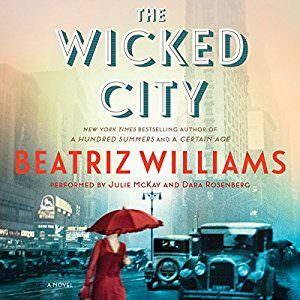 Narrated by Julie McKay and Dara Rosenberg
Narrated by Julie McKay and Dara Rosenberg
The Wicked City tells the story of two very different women who live in New York City at very different times. In 1998, Ella Gilbert has just left her husband, and in 1924, Geneva Rose Kelly – known to her friends as Gin or Ginger – is a bright young thing who can be found most evenings at Christopher’s the speakeasy next door to the apartment building where she lives. While I enjoyed both stories, the book isn’t equally split between the two; it seemed to me as though we spent about 65% of the time with Ginger and 35% with Ella, but because both storylines were equally interesting, I didn’t find myself getting impatient with one while waiting to get back to the other. That said, there are a few pacing issues in Ginger’s sections of the story, places where an overabundance of descriptive prose impedes the progress of the narrative, but this becomes less frequent as the story progresses – or I just didn’t notice it as much.
When Ella caught her husband of six years having sex with a prostitute in the stairwell of their apartment building, she was devastated and left him that very evening. She has just moved into a new place in Greenwich Village and is trying to get her bearings, pull herself back together and decide what to do next, whether to attempt to reconcile or to start divorce proceedings. Deciding to do her laundry early on a Saturday morning because she thinks it’s likely the machines will be free and it’s unlikely she’ll meet anyone else down in the basement, she is startled and a bit miffed to discover that not only are all the machines in use, but that she’s not alone. An affable, good-looking man who introduces himself as Hector engages her in conversation, and Ella is startled to discover that she is attracted to him. While she was married, she kind of “turned off” that side of herself, quite happy for her husband to be her one and only – but now those blinkers have been removed and she’s a little unnerved to be looking at a stranger through the lens of physical attraction. After a chat amid the laundry baskets, Hector leaves Ella to it, but not before he’s mentioned that coming down to the basement in the evenings probably isn’t a good idea, warning her about the noises that start up at night from the speakeasy next door, the “music and the voices, people laughing and having a good time. Sometimes you can actually feel the walls vibrate, you know, from the dancing and all that…”
Ella doesn’t think any more of that comment the next time she needs to do laundry – until she hears it for herself late at night; laughing, chinking glasses, smooth jazz… and screaming.
In 1924, Ginger Kelly, a sassy young flapper, is a regular at Christopher’s, where, to steal from Kander and Ebb, the gin is cold and the piano’s hot. This is the era of Prohibition, and a raid one night brings Gin to the attention of Oliver Anson, an austerely handsome and strait-laced Prohibition enforcement agent. Anson asks her if she’ll help him to bring down the bootleg liquor empire run by her stepfather, Duke Kelly, but Gin isn’t going there. She isn’t going to risk the consequences of being a rat, no matter how much she hates Duke – and she does hate him – and she refuses Anson’s request.
Straight after her release from custody, Gin receives a letter telling her her mother is dying, and she immediately makes her way back home to the sleepy little town of River Junction in Western Maryland. Gin tells her story in the first person, and it’s here that we learn that she ran away to New York a couple of years earlier after Duke tried to force himself upon her. Going back there and seeing him again brings it all back, and when he offers her money if she’ll deliver small packages to people in New York from time to time, Gin agrees, even though the thought of doing anything for Duke turns her stomach. But when she gets home, she contacts Anson and agrees to work with him against Duke.
Gin is sparky and funny, the sort of person who always looks on the bright side and tackles life head on. But her strength and determination are sorely tested when events unfold in such a way as to make her unsure of who to trust, all while she’s trying not to fall in love with Anson.
The book moves easily between the two stories, which intersect at various points along the way. Towards the end, we find out how both Ella and Hector are related to the speakeasy and some of the people who frequented it, but the ending as a whole is somewhat dissatisfying, as it leaves a lot of unanswered questions. While it seems that both couples have arrived at HFN endings, I wanted to know more. Did Ella lose her job? What was the significance of the box of buttons she found hidden under a floorboard (the listener knows the box used to belong to Ginger)? What happened to Ginger and Anson? What happened at River Junction after Duke was gone? I don’t know if the author plans a sequel, but there’s surely enough left hanging here to warrant one.
I’m not familiar with either of the narrators, but both deliver effective and enjoyable performances here that accurately reflect the characters of Ginger and Ella. Ella’s narrative is strongly performed by Julie McKay, whose natural, mezzo-range voice is generally pleasing to the ear, and really suits the character of the well-educated, New York professional. Ms. McKay differentiates very well between all the characters she performs – there’s never any confusion in the few scenes to feature several female characters, and I really liked her portrayal of Hector, whose warmth and charm is evident in every word. I do have a couple of minor criticisms though, one of which is that she seems to have adopted some kind of drawl – or perhaps it’s not adopted – which means that ends of words often sound elongated; and the other is that her pacing is just a teeny bit on the slow side. But those really are minor issues and didn’t get in the way of the story at all. Dara Rosenberg gives voice to Ginger and her softer timbre and higher pitch are a nice contrast to Ms. McKay’s darker tones. I freely admit to not being an expert on American accents, and as I was listening I emailed our esteemed editor, Melinda, to ask her if people from Western Maryland normally sound like Dolly Parton! So I can’t attest as to whether the accent Ms. Rosenberg has adopted for Gin is accurate, but it is at least consistently maintained throughout. Like her narrating partner, she also delineates each of her characters very well, and makes use of a suitably masculine pitch and timbre to perform Anson and the other male characters in her part of the story.
As I said at the beginning, I did have a few issues with some of the pacing of the story in the early stages, but taken as a whole, The Wicked City turned out to be an engrossing and entertaining listen that provided something a little different to my normal listening fare. I’m happy to recommend it to others and plan to check out more of this author’s work in both print and audio sometime soon.
Caz
Narration: B+
Book Content: B+
Steam Factor: Glad I had my earbuds in (but at the very tame end)
Violence Rating: Fighting, hints of sexual abuse
Genre: Women's Fiction
Publisher: Harper Audio
The Wicked City was provided to AudioGals by Harper Audio for a review.
[jwl-utmce-widget id=32435]



3 thoughts on “The Wicked City by Beatriz Williams”
Comments are closed.